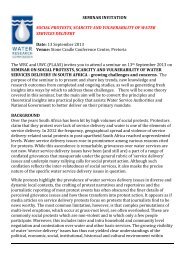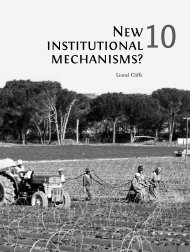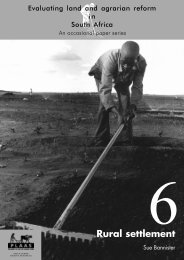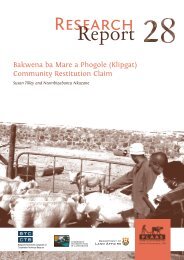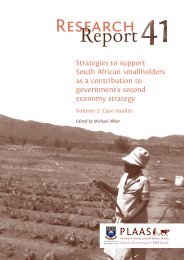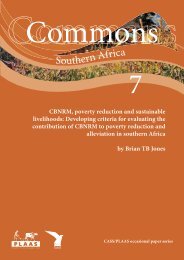Create successful ePaper yourself
Turn your PDF publications into a flip-book with our unique Google optimized e-Paper software.
terms of their employment and the type ofwork they are able to do.Because women’s work is seen as low-status‘unskilled’ labour, in monetary terms it isvalued well below men’s work. Farmersjustify this by claiming that women usuallyperform ‘unskilled’ work on the farm,but even when men and women workalongside each other fulfilling identicalwork functions, women still often earn lessthan their male counterparts.Female farm workers are also at adisadvantage in housing allocation, ashousing contracts have been historically tiedto permanent farm labour contracts, whichhistorically only men can access. So whenmen lose their jobs, the whole family can beleft homeless, and if a male worker dies oris retrenched, the whole family can be outon the streets. While laws introduced since1994 prohibit linking employment contractswith housing, the practice is still common.Since physical and emotional abuse ofwomen by male partners is rife (in partbecause of the legacy of the tot systemand pervasive alcohol dependence), thissystemic discrimination against womenfurther compromises their ability to leaveabusive relationships and underminestheir safety of that of their children. Giventhe known intersection of gender-basedviolence and HIV/AIDS infection rates, thisblatant discrimination against women haslife and death consequences for them andtheir children.So it is significant that DAFF has for the firsttime committed to going beyond slogansand developing a comprehensive strategyon women’s empowerment to combatthe pervasive discrimination against andmarginalisation of women in agriculture.The litmus test of success for the Summitis not participation by 600 hope-filledfarm workers, or addresses from PresidentZuma, Cosatu Secretary General Vavi oreven the disarming Northern Cape charmof Minister Joemat-Pettersson, who held usall in the palm of her hand in her closingaddress, but rather whether it delivers onits promises. Libraries can be filled withsummit resolutions, but the millions spenton delegates from across the country willcome to naught if the lofty goals are notimplemented.It is unfortunate that Agri SA walked outon an important opportunity to help shapeagricultural transformation, but we hopegovernment finally realises the truth thatwhite farmers have little commitment todoing right by those who built their wealth– the evidence is all around us. These farmers– prime beneficiaries of apartheid throughdirect subsidies, protectionist measures anda guaranteed steady cheap labour supplydue to influx controls and poor labour laws– still don’t grasp the magnanimity of farmworkers who continue to carry the industrydespite having nothing to show for over300 years of exploitation. Instead of againbending over backwards to accommodatethe whims and tantrums of commercialagriculture, let’s proceed in the hopefulspirit of the Summit.Fatima Shabodien, Women on Farms Project(WFP)Research updates’Threats Towards Attaining Food Securityand Food Sovereignty in the Eastern CapeProvince’Masifunde, Zingisa and the Trust forCommunity Outreach and Education(TCOE) will be launching their new study,’Threats Towards Attaining Food Securityand Food Sovereignty in the Eastern Cape(EC) Province’, at Rhodes University towardsthe end of May 2011. The study investigatesprojects initiated under: a) the Massive FoodProduction Programme (MFPP) funded bythe Eastern Cape Department of Agricultureand Rural Development (ECDoA), whichadopted a ‘green revolution’ strategy topromote genetically modified maize andsoya production; and b) private sectorinitiatedcash crop production projects.Research in four villages in communal areasin the Amathole District Municipality showsthat these projects do not serve the interestsof small-scale black farmers or promote foodsecurity in the region. Rather, they promotethe interests of agri-business while usingsmall-scale farmers as a testing ground forthe ‘green revolution’ in South Africa. Theprojects rely on intensive use of expensivechemical inputs, with potentially devastatingeffects on the health, environment andnatural resources (such as water) of localpopulations. These populations are alsoused as cheap labour and integrated intoformal value chains and markets underhighly exploitative conditions that extracttheir surplus, while leaving them to assumeall the risks of production. They use theirbest (consolidated) lands and scarce raindependentwater resources under collectivefinancial and production contracts that lacktransparency and accountability.Most projects in these villages have failedto fulfil their promise to increase foodsecurity, create jobs, alleviate poverty andenable small-scale black farmers to become‘successful commercial producers’. Failurehas translated into indebtedness linked to:• production failure due to lack ofwater and late delivery of inputs andservices;A bulletin tracking land reform in South Africa January 20113



